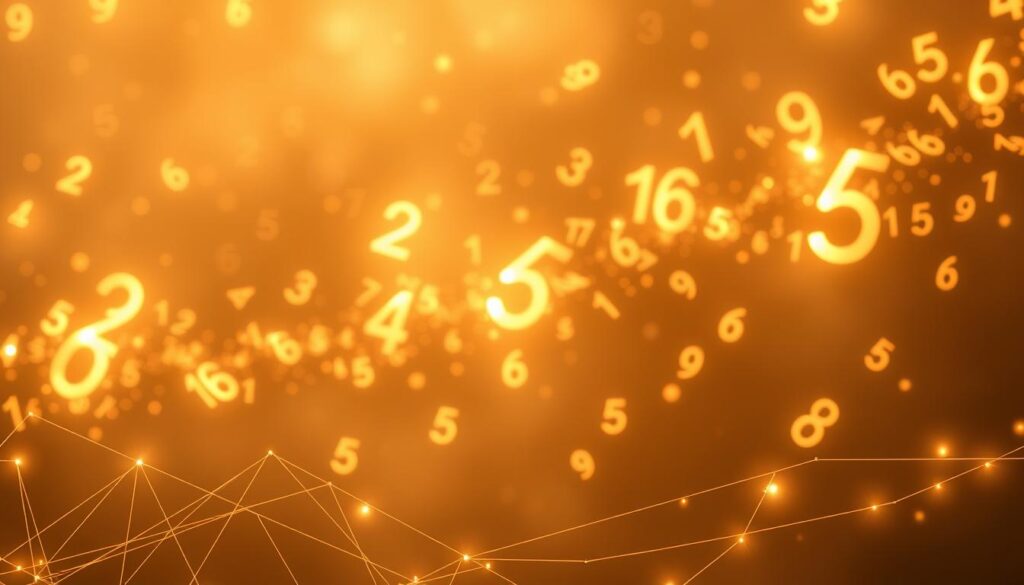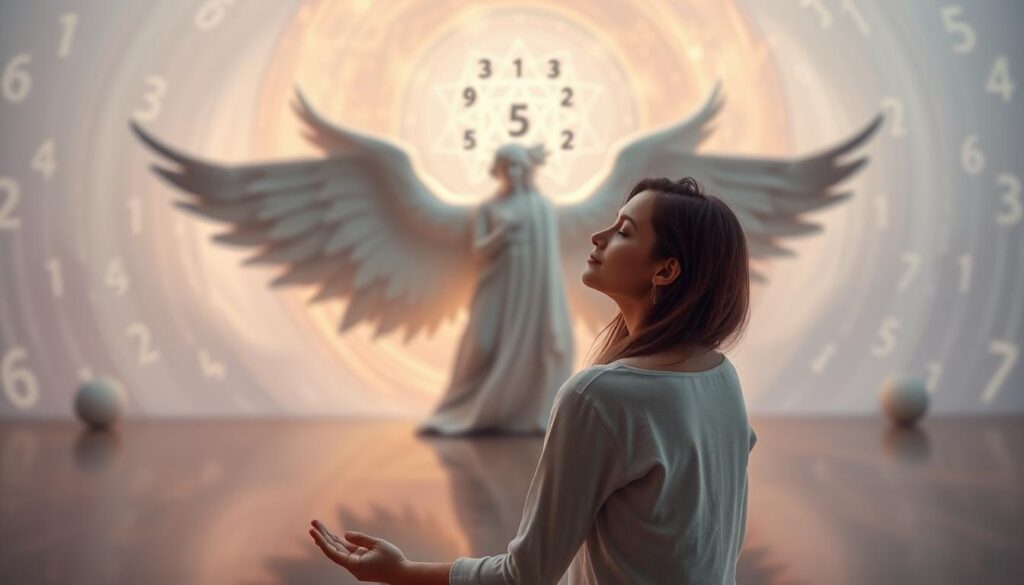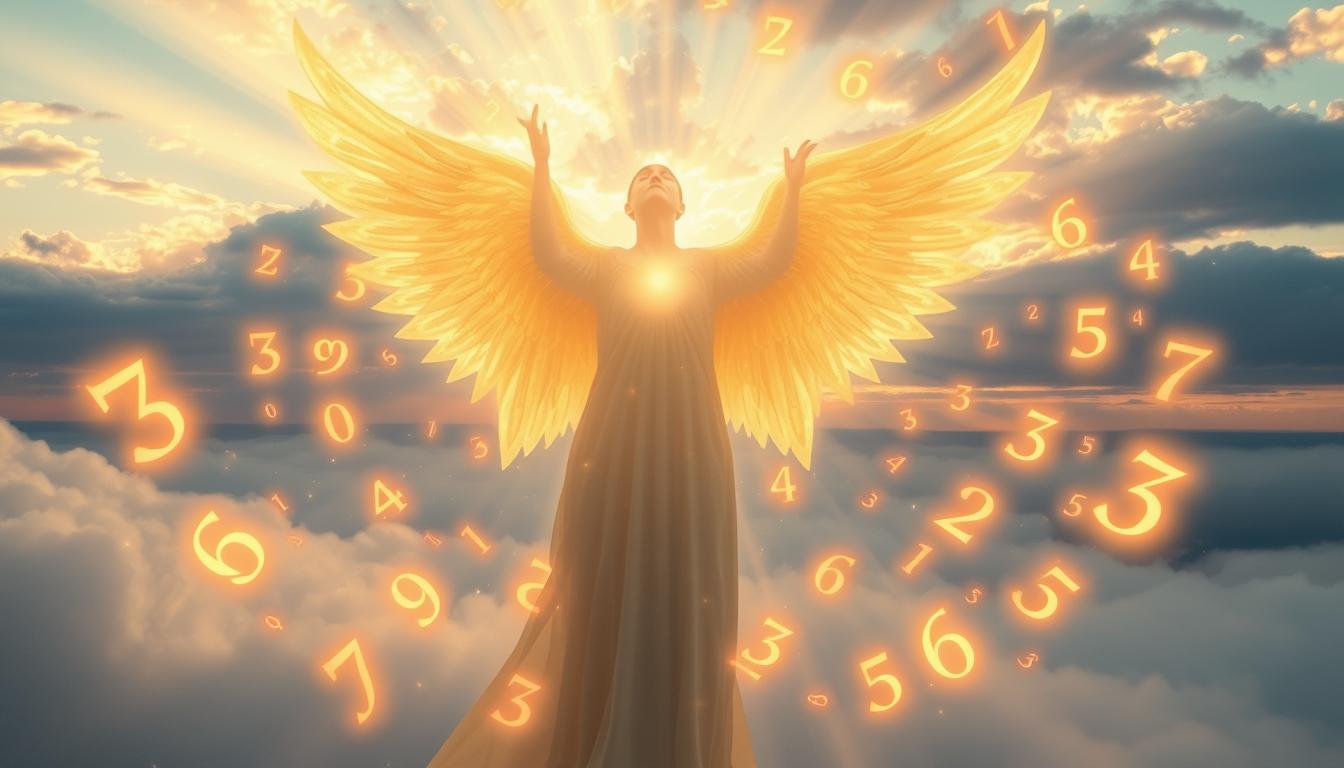Repeating digit patterns like 111 or 444 catch attention everywhere—from digital clocks to receipts. Many believe these sequences carry deeper messages from the universe or spiritual guides.
The concept gained fame through Doreen Virtue’s 2004 book, though she later rejected it. Today, social media fuels curiosity, with hashtags like #angelnumbers amassing millions of views. Celebrities flaunt jewelry featuring these digits, adding to the trend.
But is there truth behind the hype? Some share personal stories of warnings before accidents, while skeptics call it coincidence. This exploration balances mystical views with logical explanations.
Key Takeaways
- Repeating digits appear in daily life, sparking spiritual interpretations
- Social media and celebrities popularized the trend globally
- Doreen Virtue introduced then abandoned the concept
- Personal anecdotes contrast with scientific perspectives
- The debate continues between believers and skeptics
What Are Angel Numbers? A Modern Spiritual Phenomenon
Modern spirituality embraces numerical patterns as cosmic nudges from unseen guides. These repeating digits, like 111 or 444, carry symbolic meanings, often tied to alignment or support. Doreen Virtue’s 2005 book cataloged interpretations for every triple-digit combination, fueling their popularity.

Defining Angel Numbers and Their Popularity
Believers view these sequences as intentional messages from the universe or spirit guides. Over 50% of Gen Z links such symbolism to mental wellness, blending mysticism with self-care. Unlike traditional clairvoyance, this practice thrives on accessible, everyday sightings.
Common Sequences and Their Interpretations
Each combination holds unique weight. For example:
- 111: Signals new beginnings or manifestation energy
- 444: Indicates protective presence from angels
- 888: Tied to financial abundance and balance
Skeptics argue these are coincidences, but followers find comfort in their consistency.
Angel Numbers in New Age Culture and Social Media
TikTok simplifies numerology, turning birth dates into “personal” digits. Meditation apps incorporate these symbols, while Instagram infographics decode sightings. This digital-age twist contrasts ancient systems, like Pythagoras’ gender-based theories, yet resonates globally.
The Origins of Angel Numbers: From Pythagoras to Doreen Virtue
Long before digital clocks displayed 11:11, ancient thinkers saw mystical power in numerical sequences. The Greek philosopher Pythagoras believed digits vibrated with cosmic energy, linking math to spirituality in the 6th century BCE. His teachings laid the foundation for modern numerology, where patterns like 333 or 777 hint at deeper truths.

Ancient Numerology and Early Symbolism
Pythagoras’ followers assigned meanings to digits—odd numbers were masculine, evens feminine. This system evolved across cultures, from Hebrew gematria to Chinese numerology. Unlike today’s personalized interpretations, ancient codes focused on universal harmony.
Doreen Virtue’s Role in Popularizing Angel Numbers
In the 2000s, Doreen Virtue transformed numerology into a New Age sensation. After a traumatic carjacking, she shifted from psychotherapy to channeling angel messages. Her 2005 book sold 1.5M+ copies, claiming flight 433 signaled “ascendant masters’ support.”
Media appearances on Oprah and translations into 38 languages cemented her fame. Followers saw divine signs everywhere—even in $77 pants. Like psychic artistry, her work blended intuition with tangible symbols.
Why Virtue Later Rejected Her Own Concept
In 2017, Virtue denounced her teachings after converting to Christianity, calling angel numbers “detestable” under Deuteronomy 18:10-13. The fallout was swift: publisher refunds, IRS liens for $2M in unpaid taxes, and a move from her Hawaii ranch.
TikTok rumors swirled—had demons influenced her reversal? Yet her story underscores how spiritual paths can shift dramatically, leaving followers questioning what’s real.
Are Angel Numbers Real or Just Coincidence?
Taylor Swift’s 888 tattoo symbolizes hope, but scientists call such beliefs “patterned illusions.” With 69% of Americans believing in celestial messengers, the divide between faith and logic fuels heated discussions. Below, we dissect three lenses—psychological, theological, and empirical—to explore why patterns like 111 or 777 captivate millions.

The Psychological Perspective: Pattern Recognition and Confirmation Bias
Our brains excel at finding order in chaos—a trait called apophenia. Noticing 11:11 on clocks feels meaningful, yet statistically inevitable. Studies show people recall “hits” (e.g., 444 during stress) while ignoring non-matches. “It’s like seeing shapes in clouds,” notes neuroscientist Dr. Ellen Langer.
Confirmation bias amplifies this. A Reddit user shared: “I saw 666 before my breakup—proof it’s bad luck!” They overlooked hundreds of uneventful 666 sightings. This selective memory fuels the belief in coded messages.
Biblical and Skeptical Views on Angel Numbers
Traditional angelology depicts messengers delivering specific directives—not vague digit hints. Deuteronomy 18:10-13 condemns omens, a stance Doreen Virtue now echoes:
“Seeking signs breeds passivity. Real faith requires action.”
Critics argue New Age interpretations lack scriptural backing. Unlike biblical angels who named recipients (e.g., Gabriel to Mary), modern numerology generalizes meanings—777 signifies luck, regardless of context.
Scientific Debunking vs. Personal Testimonials
No peer-reviewed studies validate angelic communication via digits. Mathematician Dr. John Allen Paulos notes: “Humans underestimate randomness. A million people seeing 888 daily guarantees some will tie it to life events.”
Yet testimonials persist. A TikToker credited 555 for her promotion, while another blamed 333 for a car crash. This duality mirrors psychic art debates—subjective validation versus empirical proof.
Why People Believe in Angel Numbers: Comfort or Deception?
A 2023 study revealed 40% of millennials seek signs in everyday patterns to cope with stress. For many, repeating digits offer a sense of control amid chaos—like a cosmic GPS. But critics argue this belief can blur the line between guidance and avoidance.

The Appeal of Spiritual Guidance in Uncertain Times
Pandemic loneliness and financial instability fuel the search for meaning. “Seeing 333 felt like a hug from the universe,” shared a TikTok user battling job loss. Unlike traditional faiths, New Age practices like numerology require no clergy—just a keen eye for patterns.
Yet therapists warn: over-reliance on spirit guides may delay practical solutions. One of Virtue’s followers ignored 444 warnings before her mother’s fatal accident, later regretting her inaction.
Potential Risks: False Hope and Avoidance of Responsibility
Manifestation culture twists digits into excuses. A Reddit thread exposed users skipping rent, trusting 888 for “abundance.” Others blamed 555 for breakups instead of communication gaps.
False hope peaks when symbols replace critical thinking. Virtue herself renounced advising fans to quit jobs or move to Peru based solely on numerical “signs.”
Angel Numbers vs. Traditional Faith Systems
Christianity and Islam emphasize prayer with actionable steps—not passive waiting for coded messages.
“God gave us emotions—anger and sadness are valid,”
Virtue now preaches, contrasting her earlierteachings.
Social media’s #GoodVibesOnly trend amplifies this divide, dismissing struggles as “low vibrations.” Unlike structured religions, DIY spirituality lacks accountability—a gap that leaves many adrift.
Conclusion: Navigating the Mystery of Angel Numbers
Seeing repeating digits can spark curiosity or comfort, but balance is key. While these patterns offer hope for some, science shows no proof of divine messages. Doreen Virtue’s journey—from fame to financial struggles—reveals the risks of over-reliance on signs.
Ask yourself: does this guide my path, or am I avoiding tough choices? Journaling or meditation may provide clarity without numerology. For those of faith, scripture emphasizes wisdom over random digits.
Trust your gut, but pair intuition with action. Whether it’s 888 or a gut feeling, real change comes from work, not just waiting for cosmic hints.

